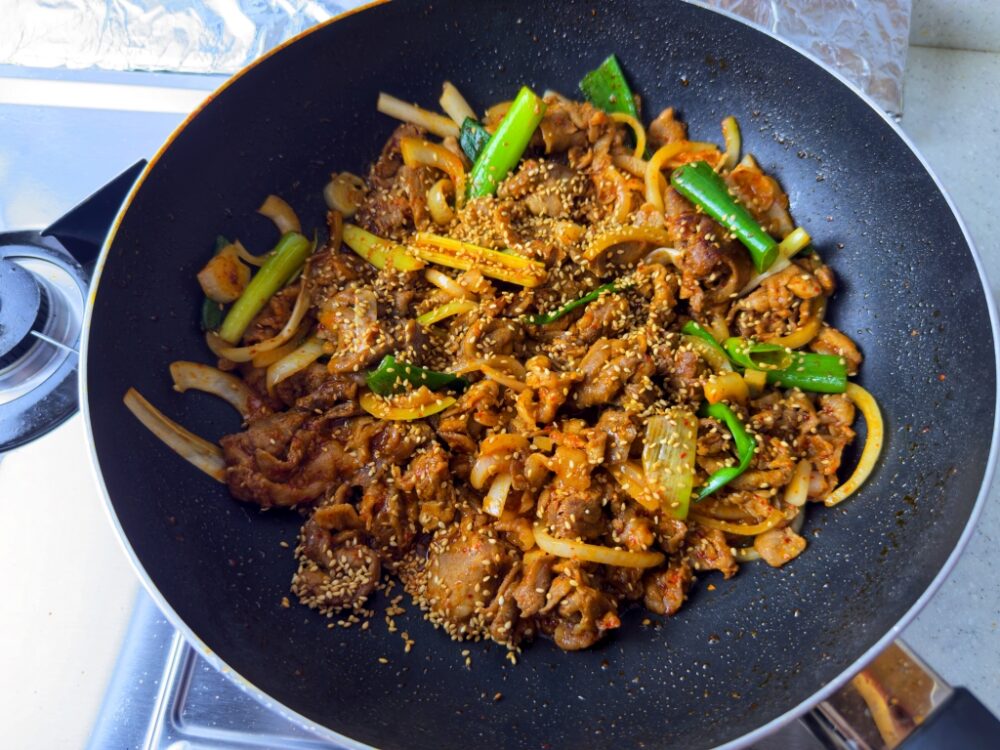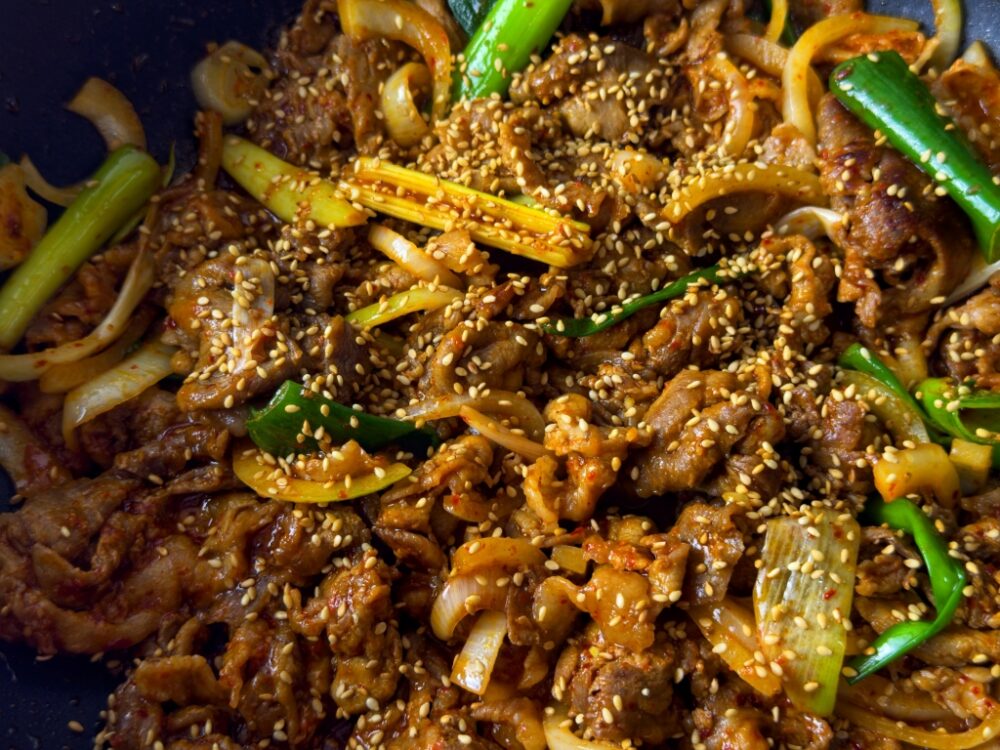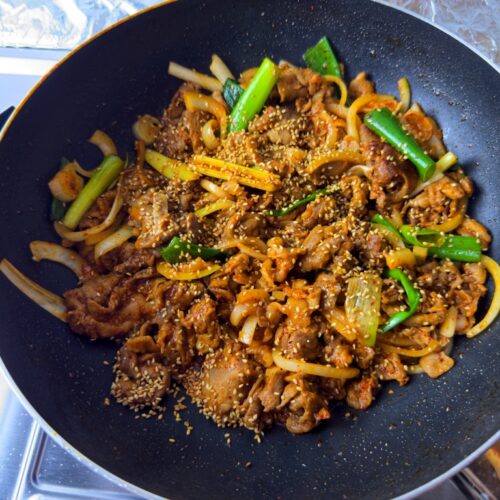

Introduction to Stir-Fried Pork Belly Recipe
Stir-fry Recipesis a classic rice stealer that's always filling and will make your rice sizzle. Stir-frying the pork in a seasoning of chili powder and gochujang gives it a sweet and spicy flavor that's sure to wake up your taste buds.
Today's recipe is a little sweeter than the standard version, but you can make it spicier by adding green onions and chili peppers. This is an easy meal that anyone can make, and I'm going to show you how to make it step-by-step, so let's get started. Pork Stir-Fry Recipe Let's get started.
Tips for success
- 🥩 â Select a cut of meat: The forequarter has just the right amount of fat so it marinates well, but the scaffolding can be too much.
- 🧂 â Ground Meat: Marinating the meat in sugar first will deepen the flavor and tenderize the meat.
- 🌶️ Adjusting spicinessNote: If you like it spicy, add 2 chopped green chilies. If you're serving this with kids, you can leave it out.
About the Stir-fried Pork Belly recipe
Jeyukbokkeum is a staple in Korean home cooking: it's a quick dish to make with simple ingredients and a perfect balance of flavors.
It started out as a spicy gochujang condiment, but it has evolved to have different ratios of sweet, salty, and spicy depending on the region or household. Today's Pork Stir-Fry Recipeis a "flexible version" with a sweet flavor base and a spicy kick from chili peppers. It's perfect for a home-cooked meal or as an appetizer for drinks.

Pork Stir-Fry Recipe
Equipment
- 1 Frying pan
- 1 measuring spoon1T=15cc, 1t=5cc
- 1 Knife and cutting board
Ingredients
- 700 g Pork forequarter Can be substituted with pork belly or pork chops
- 2 T Sugar White or brown
- 2 T Dark soy sauce
- 1 dog Onion
- 1 vs Scallions
- 1 T Cooking oil Canola oil, grapeseed oil, etc.
- Slightly Sesame seeds Finishing Garnishes
- 2 dog Cheongyang Peppers Can be omitted
Marinades
- 2 T Chili powder
- 2 T Gochujang
- 3 T Flavors
- 2 T Watercress
- 1 T Oyster sauce
- 1 T minced garlic
Instructions
- Toss the pork butt with 2 T sugar and 2 T dark soy sauce and marinate for 30 minutes.700 g pork front leg, 2 T sugar, 2 T dark soy sauce
- Make the marinade by combining the chili powder, gochujang, mirin, rice wine, oyster sauce, and minced garlic.2 T chili powder, 2 T gochujang, 3 T mirin, 2 T watercress, 1 T oyster sauce, 1 T minced garlic
- Roughly chop the scallions, dice the onion, and thinly slice the green onion.1 onion, 1 vs. green onions, 2 green onion peppers
- In a skillet over medium-high heat, heat 1 T of oil and add the marinated meat.1 T cooking oil
- When they change color, add the marinade and stir-fry over medium heat for 5 minutes.
- Add the trimmed veggies and saute for 3 minutes, until just wilted.
- Remove from heat and sprinkle with whole sesame seeds to finish.Some sesame seeds
Notes
- Pork belly and pork chop can be substituted for the front leg
- Adjust spiciness with the number of green chiles
- Store in an airtight container in the refrigerator and consume within 2 days
What to bring
Materials
- 500 to 700 g pork forequarter Go to 👉 View
- 2 T sugar Go to 👉 View
- 2 T dark soy sauce Go to 👉 View
- 1 green onion Go to 👉 View
- 1 onion Go to 👉 View
- a few sesame seeds Go to 👉 View
- 2 green chiles (optional) Go to 👉 View
- 1 T cooking oil Go to 👉 View
Marinade ingredients
- 2 T chili powder Go to 👉 View
- 2 T gochujang Go to 👉 View
- 3 T rice wine Go to 👉 View
- 2 T rice bran Go to 👉 View
- 1 T oyster sauce Go to 👉 View
- 1 T minced garlic Go to 👉 View
Tools to use
- Frying pan
- Knives and cutting boards
- Measuring Spoons Go to 👉 View
👉 All measurements will be in tablespoons (1T=15cc, 1t=5cc).
This post is part of my work with Coupang Partners, which means I receive a small commission.
Substitutable materials
- Front leg meat → pork shoulder (tender and flavorful), pork belly (chewy)
- Oyster sauce → soy sauce + sugar (to adjust flavor)
- Water starch → oligosaccharides or honey (sweetness adjustable)
The creation process



1) Toss the pork forequarters with 2 T sugar and 2 T dark soy sauce and marinate for 30 minutes.
💡 Adding the sugar first allows the sweetness to penetrate the meat and tenderize it.


2) Make the marinade: 2 T chili powder, 2 T gochujang, 3 T mirin, 2 T rice bran, 1 T oyster sauce, 1 T minced garlic, and mix well.
💡 Making the marinade ahead of time allows the flavors to blend better and develop more flavor.


3) Halve and roughly chop the scallions and halve and dice the onion.
💡 Scallions add sweetness when stir-fried, and onions neutralize the spiciness of the sauce.
4) For extra heat, halve and thinly slice 2 green chiles.
💡 Add the green onions at the very end so they don't lose their flavor.


5) Heat 1 T of cooking oil in a skillet over medium-high heat and add the marinated meat.
💡 You'll need to start with high heat to get the color, then reduce to medium to avoid burning.



6) Stir-fry until the meat is no longer pink, then add the reserved marinade and simmer for another 5 minutes.
💡 It's almost done when it starts to glisten with the marinade.


7) Add all the trimmed vegetables and stir-fry briefly for 3 minutes, until the vegetables are just beginning to wilt.
💡 If you fry it too long, the onions will soften and the meat will become tough.

8) Remove from heat and finish with a sprinkle of whole sesame seeds.
💡 Whole sesame seeds add texture and nutty flavor.
Storage & Utilization
The finished brisket will keep for up to 3 days in the refrigerator or 7 days in the freezer.
Lightly sauté in a skillet rather than reheating in the microwave to restore the initial shine and flavor.
Leftover pork is great for kimchi fried rice, pork rice bowls, or wrapped in nori or lettuce.
It's a versatile dish that can be used as a side dish for rice, a side dish for bento boxes, and even a snack for drinking.
FAQs
Q. Can I substitute pork belly for the front leg meat?
A. Sure. Pork belly is much more tender and flavorful, but it's greasy, so you need to reduce the amount of oil when stir-frying.
Q. Do I have to add oyster sauce?
A. No. If you don't have it, you can substitute 1 T dark soy sauce and 1 t sugar for a similar flavor.
Q. The seasoning is too salty, what can I do?
A. You can add a little more onion, or sauté with 2 T of water at the end to soften the liver.
Q. The spicy flavor is too weak, how can I make it stronger?
A. Try adding more green chiles or increasing the amount of chili powder by 1 T.
Q. I want to reduce the sweetness.
A. Use only 1 T of sugar, and add a little more flavoring instead of water to make it less sweet.
Q. What should I do if the odor is bad?
A. Add 1 T ginger juice or 1 T mirin when marinating meat to reduce odors.
Finalize
Today we'll be using Pork Stir-Fry Recipein this article. You'll learn how to tenderize meat by sweetening it with sugar first, and you'll be able to make it delicious any time you remember the seasoning ratios. It's a simple dish that disappears in a bowl of rice in no time, so give it a try!





